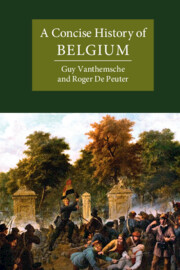Book contents
- A Concise History of Belgium
- Cambridge Concise Histories
- A Concise History of Belgium
- Copyright page
- Dedication
- Contents
- Figures
- Maps
- Acknowledgments
- Note on the Text
- Introduction
- 1 Earliest Times
- 2 The Era of the Frankish Kingdoms
- 3 The Origins of the Medieval Principalities
- 4 Unifying the Netherlands: The Burgundy–Habsburg Period (1384–1555)
- 5 The Spanish Netherlands (1555–1700/1713)
- 6 The Austrian Netherlands (c.1700–1780)
- 7 The Formation of a New Nation-State (1780s–1830)
- 8 The Consolidation of a Bourgeois Regime (1831–1880s)
- 9 The Belgian Nation-State at Its Height (1880s–1945)
- 10 The Metamorphoses of a Nation-State (from 1945 to the Present Day)
- General Conclusion
- Appendix: List of Rulers, Sovereigns and Heads of State (1419–Present) and of Governors General (1507–1794) of the Southern Low Countries and Belgium
- Further Reading
- Index
3 - The Origins of the Medieval Principalities
(Tenth-Fourteenth Centuries)
Published online by Cambridge University Press: 16 March 2023
- A Concise History of Belgium
- Cambridge Concise Histories
- A Concise History of Belgium
- Copyright page
- Dedication
- Contents
- Figures
- Maps
- Acknowledgments
- Note on the Text
- Introduction
- 1 Earliest Times
- 2 The Era of the Frankish Kingdoms
- 3 The Origins of the Medieval Principalities
- 4 Unifying the Netherlands: The Burgundy–Habsburg Period (1384–1555)
- 5 The Spanish Netherlands (1555–1700/1713)
- 6 The Austrian Netherlands (c.1700–1780)
- 7 The Formation of a New Nation-State (1780s–1830)
- 8 The Consolidation of a Bourgeois Regime (1831–1880s)
- 9 The Belgian Nation-State at Its Height (1880s–1945)
- 10 The Metamorphoses of a Nation-State (from 1945 to the Present Day)
- General Conclusion
- Appendix: List of Rulers, Sovereigns and Heads of State (1419–Present) and of Governors General (1507–1794) of the Southern Low Countries and Belgium
- Further Reading
- Index
Summary
After centuries of state formation, fourteenth-century “Belgium” consisted of three duchies (Brabant, Limburg, and Luxemburg), three counties (Flanders, Hainaut, and Namur), a prince-bishopric (Liège) and some smaller territories. The names and, in some measure, also the territories of the present-day Belgian provinces refer to these historical principalities. The dukes, counts, and prince-bishops were vassals of the French king or the German king-emperor (medieval German kings often bore the title of Holy Roman Emperor; for simplicity’s sake we only use the title of (Holy Roman) Emperor in this and the following chapters). The counts of Flanders and Hainaut were vassals of both the French king and the emperor. The power of counts and dukes very much depended on the monarch’s (in)ability to check their ambitions (see Map 3.1).
- Type
- Chapter
- Information
- A Concise History of Belgium , pp. 73 - 106Publisher: Cambridge University PressPrint publication year: 2023



